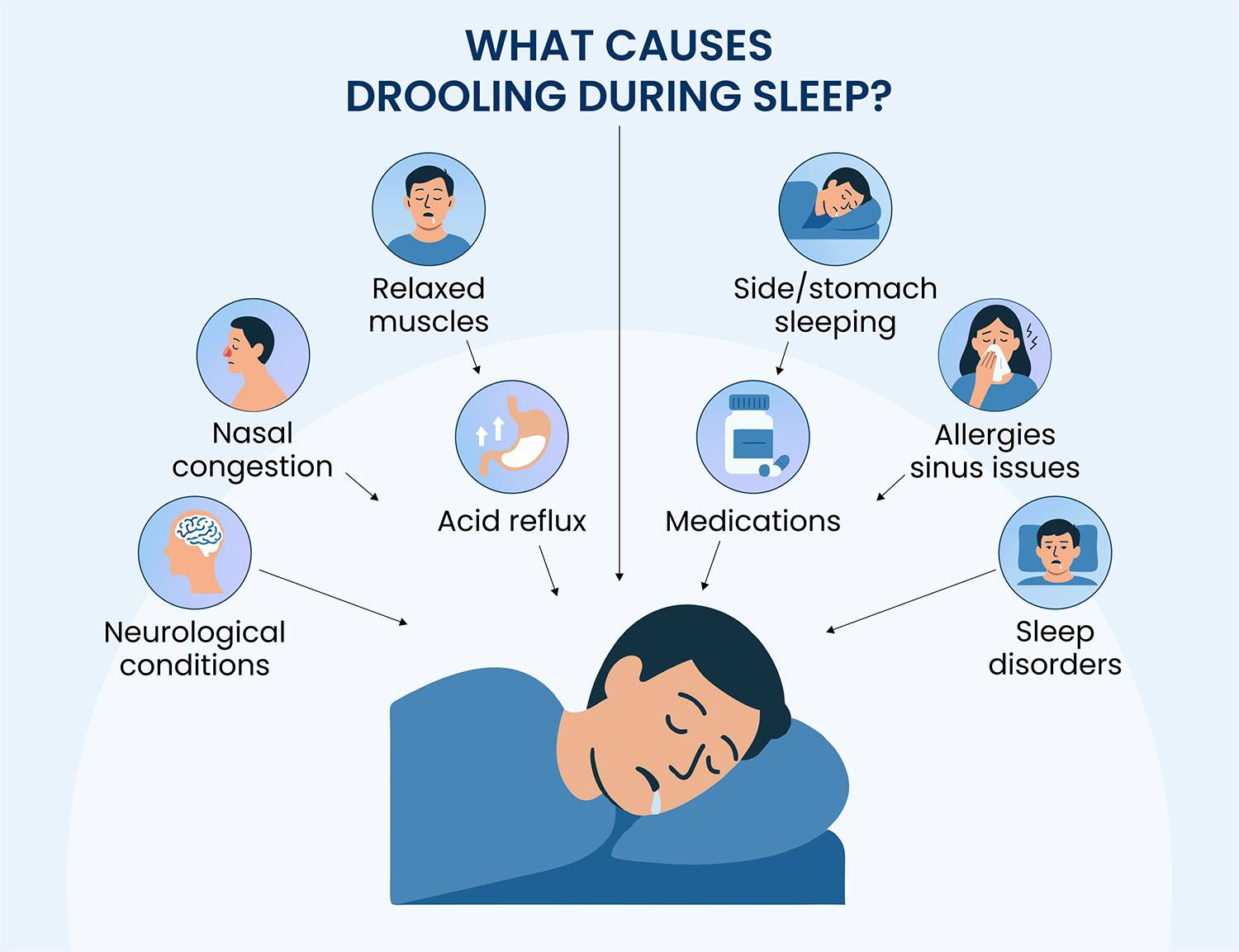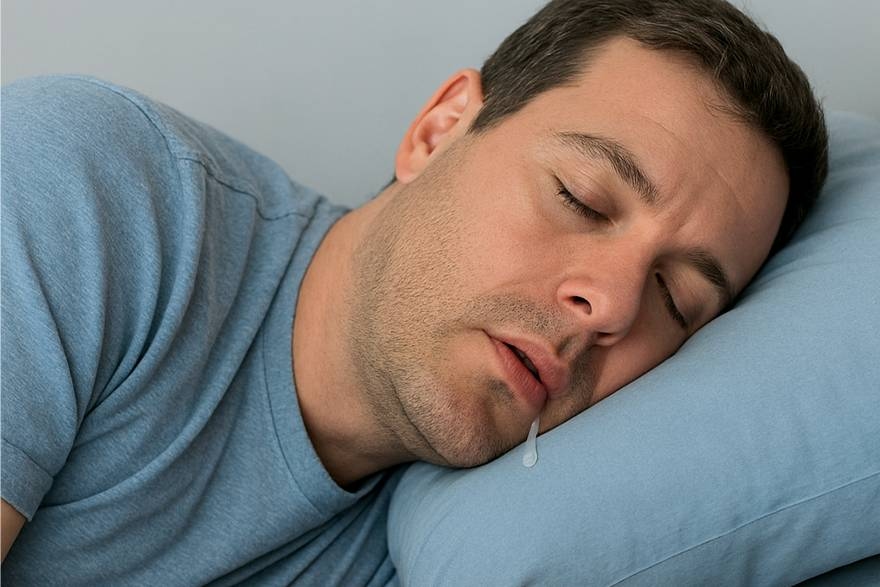Waking up to a wet pillow is not only annoying but it is also more common than you think. Research indicates that about 30% of adults drool in their sleep during some point and often don't realize it.
Occasional drooling is no big deal, but copious or constant salivating can affect your sleep quality, leave you feeling under-refreshed, and can even indicate something greater might be at play.
In this guide, we'll outline practical, evidence-based recommendations for preventing drooling while sleeping, so you can wake up feeling fresh, confident, and prepared to start the day.
What is Drooling in Sleep?
Drooling during sleep, or sialorrhea, occurs when saliva builds up in your mouth while you’re sleeping and you let some of it escape. Normally, the body produces anywhere from 0.5 to 1.5 liters of saliva in a day and much of it is unconsciously gulped down.
When you sleep, however, the muscles relax, swallowing slows down, and saliva has time to pool in an awake state. In this position, if you happen to be sleeping on your side or stomach, gravity works with the saliva to escape.
Drooling during sleep is typically harmless and temporary, but in some cases more frequent drooling can indicate allergies, nasal congestion, acid reflux, or even a neurological problem. Therefore it is necessary to understand the causes before any preventative measures are taken.
Why Do You Drool in Your Sleep?
Drooling in sleep can feel embarrassing, but it’s more common than you may think. There are a number of possible explanations for drooling, including how you sleep and certain health conditions.
- Relaxed Muscles While Sleeping – The muscles in the face and throat are relaxed during sleep and may lead to increased difficulties with swallowing saliva.
- Sleep Position – Side or stomach sleeping naturally elevates drooling because gravity pulls saliva out of the mouth.
- Nasal Congestion – If both nasal passages are blocked, mouth-breathing is essential, which can lead to increased saliva drooling.
- Allergies & Sinus Issues – Both allergies and sinus issues are also causes of excess saliva drooling.
- Gastroesophageal Reflux Disease (GERD) – GERD can stimulate saliva production to neutralize stomach acid at night, which can cause drooling.
- Medications – Certain prescriptions include medications to treat muscle disorders or antipsychotic medications, some medications may affect reflexes related to swallowing saliva.
- Neurological Conditions – In people with a diagnosis of a neurological condition such as (Parkinson’s disease or ALS), swallowing will sometimes be impaired (less control).
- Sleep Disorders – Sleep disorders such as sleep apnea can influence breathing and swallowing patterns which can lead to drooling.

Is Drooling While Sleeping Bad?
For the majority of people, drooling during sleep does not pose a problem—this is usually due to relaxation of the muscles, sleeping position, or mucus. Rare drooling while sleeping is completely normal and not a cause for concern.
But if drooling becomes frequent, excessive, or occurs abruptly, there may be more serious underlying issues:
- Chronic allergies or sinus infections
- Gastroesophageal Reflux Disease (GERD)
- Side effects to medication
- Neurological disorders that affect swallowing or muscle function
Drooling in these scenarios can impact sleep quality, lead to skin irritation around the mouth, and indicate further health issues that require medical assistance.
How to Stop Drooling in your Sleep?
If you find nighttime drooling to be troublesome, the good news is that a few simple changes can make a big difference. Here are some helpful ways to decrease or eliminate nighttime drooling:
Adjust Your Sleeping Position
Consider sleeping on your back, rather than on your side or stomach, to minimize saliva leakage.
Address Nasal Congestion
Use saline sprays, humidifiers, and/or treatments for allergies to keep nasal passages clear and reduce mouth breathing.
Hydrate
Being dehydrated can cause saliva to be thicker which can create more drooling. Make sure you are drinking adequate water all day.
Change Pillows & Position
Sleeping comfortably with your head slightly elevated may improve your breathing as well as help lessen drooling.
Control Allergies or Sinus Problems
If you have allergies or sinus issues that contribute to excess saliva production, identifying the allergens or triggers (like dust or seasonal allergies) and treating them can help reduce drooling.
Review Medications
Some medications can increase drooling; if you suspect this is an issue, talk to a doctor.
Use Oral Devices
In some situations, dentists could consider reinforcing saliva management with mouthguards or oral appliances.
Treat Other Health Problem
If your drooling is severe or chronic, speak to a doctor to check for other medical causes like GERD, sleep apnea, or neurological problems.
When to See a Doctor?
While drooling during sleep is generally not harmful, it is important to see a physician if the drooling becomes frequent, excessive, or is associated with other symptoms.
Constant drooling that interrupts your sleep, causes skin changes, or is accompanied with difficulty swallowing, chronic nasal congestion, or acid reflux can be a potential indication of a health condition.
Additionally, if your drooling has suddenly changed, or if this occurs with neurological symptoms such as facial muscle weakness or slurred speech, you should see a doctor promptly.
Getting an evaluation early will ensure that conditions such as GERD, sleep apnea, or neurological conditions are appropriately identified and treated, resulting in better sleep and overall health.
Final Thoughts
Drooling during the night is a normal occurrence that is typically not a cause for concern. However, frequent or extremely excessive drooling can be a sign of an underlying issue, such as gastroesophageal reflux disease (GERD), obstructive sleep apnea, or allergies.
Simple things, such as adjusting your sleep position, drinking enough fluids, and taking medicine for nasal congestion, can really help reduce drooling and even improve the quality of your sleep.
For ongoing drooling problems, seeing a doctor can make sure you get the appropriate treatment and increase the likelihood of better, more comfortable nights sleeping.













